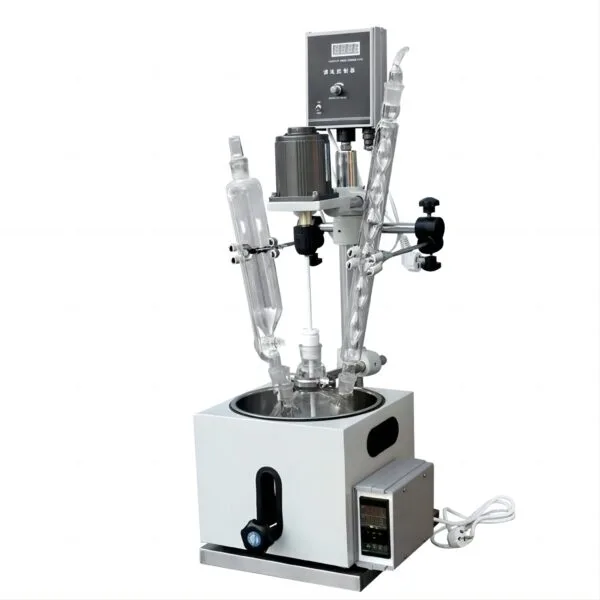Single Glass Reactor vs Double Glass Reactor: Which One is Right for Your Laboratory?
In chemical laboratories, reactors are vital pieces of equipment that facilitate various reactions, from synthesis to extraction. The choice between a single glass reactor and a double glass reactor often sparks debate. Understanding the subtle distinctions between these two types of reactors can make a significant difference in terms of efficiency, safety, and application suitability. In this article, we will delve into the comparison of the single glass reactor vs double glass reactor, helping you understand which one may be more suitable for your specific needs.

Understanding Glass Reactors
Glass reactors are used extensively in laboratory settings due to their transparency, allowing users to monitor reactions in real-time. They are essential in fields such as chemistry, pharmaceuticals, and food processing. Both single and double glass reactors serve similar core functions, but their design and structure can significantly influence the efficiency and safety of the reactions.
Single Glass Reactor: Overview
The single glass reactor, often considered a basic design, features a single layer of glass. It is typically used for reactions that do not require extreme temperature control or a vacuum environment. The single glass reactor is more affordable and simpler in construction, making it ideal for basic laboratory applications.
Key Features of Single Glass Reactors:
- Cost-Effective: Single glass reactors are generally more affordable than double glass reactors, which makes them suitable for smaller laboratories or those on a budget.
- Simple Design: With only one layer of glass, these reactors are easier to maintain and operate.
- Basic Applications: Suitable for standard reactions that do not require advanced temperature or pressure control.
For laboratories with less complex needs, a single glass reactor may be the right choice. However, there are limitations, particularly in terms of temperature control and the ability to handle high pressures or corrosive substances.
Double Glass Reactor: Overview
A double glass reactor features two layers of glass, with an insulating space between them. This design provides better temperature control, as the space between the layers can be used for heating or cooling. The double glass reactor is commonly used in reactions that require precise temperature control or the management of hazardous substances.
Key Features of Double Glass Reactors:
- Superior Temperature Control: The double-glass design allows for more efficient heating and cooling. The outer layer is often heated or cooled with circulating fluids, ensuring a stable reaction environment.
- Enhanced Safety: The double-glass construction provides a barrier between the reactive contents and the external environment, enhancing safety, particularly when handling volatile or toxic substances.
- Versatile Applications: Double glass reactors are suited for a wider range of applications, including those requiring vacuum conditions, precise temperature control, and reactions involving corrosive materials.
While the double glass reactor is more expensive than the single glass reactor, its advanced features make it the preferred choice for more complex reactions, especially in industries such as pharmaceuticals, fine chemicals, and research.
Single Glass Reactor vs Double Glass Reactor: Key Differences
The key differences between the single glass reactor vs double glass reactor lie in their design and functionality. Here is a comparative breakdown:
| Feature | Single Glass Reactor | Double Glass Reactor |
|---|---|---|
| Cost | Lower | Higher |
| Temperature Control | Basic | Advanced |
| Safety | Standard | Enhanced |
| Versatility | Limited | High |
| Applications | Simple reactions | Complex reactions requiring precise control |
As seen in the table, the double glass reactor excels in terms of temperature control, safety, and versatility. However, for simpler reactions where advanced control is unnecessary, a single glass reactor can still be a valuable and cost-effective choice.
Choosing the Right Reactor for Your Laboratory
When deciding between a single glass reactor vs double glass reactor, several factors should be considered:
- Budget: If your laboratory is on a budget and the reactions do not require advanced temperature control, the single glass reactor may be the best option.
- Application: For reactions requiring precise temperature regulation, safety precautions, or handling of hazardous substances, the double glass reactor is more suitable.
- Maintenance: Single glass reactors are simpler and generally require less maintenance. However, double glass reactors provide better long-term performance and reliability, especially for complex reactions.
Applications of Single and Double Glass Reactors
- Single Glass Reactors are commonly used in straightforward synthesis, mixing, and extraction processes. Laboratories focused on basic research or smaller-scale production often prefer these reactors.
- Double Glass Reactors find applications in industries like pharmaceuticals, fine chemicals, and biotechnology, where the need for precise control over temperature, pressure, and safety is paramount.
Where to Buy a Glass Reactor
At EquilRxnLab, we offer a range of glass reactors, including both single and double glass models. If you are looking for an efficient, reliable, and cost-effective solution, our Single Glass Reactor is an excellent choice for basic laboratory applications. For more advanced needs, our double glass reactors can provide enhanced control and safety features to meet your specific requirements.
For more information, feel free to visit our product catalog, or check out our informative content on our YouTube channel, Instagram, and Facebook.
Conclusion
In summary, both single and double glass reactors have their unique advantages, and the choice between the two depends largely on the specific needs of your laboratory. Whether you’re looking for a cost-effective, basic solution or a more advanced system for complex reactions, understanding the differences between a single glass reactor vs double glass reactor will help you make the best decision for your lab’s needs.



